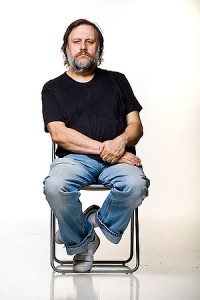Screening Žižek: Laconic Axe vs Lobottonised Thought Ideas
Ideas, New in Ceasefire - Posted on Monday, March 26, 2012 15:01 - 0 Comments
By Paul Taylor
Alan De Botton, “philosopher in residence” at Heathrow airport
In Part One Paul A. Taylor discussed how events like Screening Thought (May 20011 at the ICA, London) demonstrate the difficulty of refocusing the attention of Zizek audiences away from his individual qualities to the substance of his thought. In Part Two Taylor uses the specific experience of Screening Thought as a springboard for exploring the wider constraints imposed on serious thinking by the media.
The Media’s Ideological Wheelbarrow
“There is an old story about a worker suspected of stealing: every evening as he leaves the factory, the wheelbarrow he rolls in front of him is carefully inspected. The guards can find nothing. It is always empty. Finally, the penny drops: what the worker is stealing are the wheelbarrows themselves … ” (Zizek, Violence: 1)
The media screens thought both literally and figuratively – whilst lots of its lowbrow content does not bear seriously thinking about, more significantly, nominally serious programmes just don’t bear thinking. The most important aspect of the media’s conceptual screening comes, like the wheelbarrow-stealing worker, from the brazenness with which it carries its empty content past its observers.
Even in news or cultural programmes that have pretensions to promote considered analysis, readers should be familiar with these generally unquestioned features of the media grammar that openly structures “serious” coverage:
- time-scales for each item that are so tightly constrained that discussions are routinely truncated with the ubiquitous line: “I’m sorry we’ll have to stop there/that’s all we have time for”
- a disproportionate, sometimes almost exclusive, dependence upon (often crass) visual metaphors and/or verbal puns (Channel 4 News springs to mind)
- the extremely narrow range (in terms of both social and political class) of the “expert” commentators from whom opinions are sought
- the predominantly unquestioned status quo-friendly nature of news content – e.g. prime time medical updates on members of the Royal Family, high-profile obituaries for media personalities/journalists
- the requirement of a topical hook without which an otherwise important story will not register on the media’s radar
- a presenter through whose celebrity persona items are invariably mediated
Zizek’s theory of violence helps to illuminate the profound implications of these otherwise standard operating media procedures. He opens up the common-sense notion of violence to show that whilst we almost exclusively tend to understood the concept in terms of individually identifiable outbursts and destructive acts, in everyday reality, the most pervasively violent aspects of life are actually contained within the only apparently neutral selection processes that determine how that everyday reality is defined in the first place.
Zizek distinguishes between subjective and objective forms of violence and asks us to:
“… learn to step back, to disentangle ourselves from the fascinating lure of this directly visible ‘subjective’ violence, violence performed by a clearly identifiable agent. We need to perceive the contours the background which generates such outbursts. A step back enables us to identify a violence that sustains our very efforts to fight violence and to promote tolerance … there is a ‘symbolic’ violence embodied in language and its forms … this violence is not only at work in the obvious – and extensively studied – cases of incitement and of the relations of social domination reproduced in our habitual speech forms: there is a more fundamental form of violence still that pertains to language as such, to its imposition of a certain universe of meaning. Second, there is what I call ‘systemic’ violence, or the often catastrophic consequences of the smooth functioning of our economic and political systems.” (Violence: 1)
The ‘imposition of a certain universe of meaning’ succinctly describes the ease with which the contemporary media routinely excludes conceptual analysis, not through explicit prohibition, but through its implicit, “natural” functioning.
 Daft as a Brush – Idle Talk, Lobottonised Thought and the Media Industrial Non-Complex
Daft as a Brush – Idle Talk, Lobottonised Thought and the Media Industrial Non-Complex
“Idle talk is something that anyone can rake up; it not only releases one from the task of genuinely understanding, but develops an undifferentiated kind of intelligibility, for which nothing is closed off any longer … that public disclosedness of Being-with-one-another where the loudest idle talk and the most ingenious curiosity keep ‘things moving’, where, in an everyday manner, everything (and at bottom nothing) is happening. This ambiguity is always tossing to curiosity that which it seeks; and it gives idle talk the semblance of having everything decided in it.” (Martin Heidegger, Being and Time: 213 & 218-9)
Predictably excluded from the serious media’s narrow frame of reference, Martin Heidegger coined the memorable phrase idle talk to describe the symbolic violence caused by the media’s reliance upon the ‘undifferentiated kind of intelligibility’ that replaces substantive thought with spectacle-infused pseudo-events and tautologically self-selecting talking heads (the media figures well known for being well known explored in the final Part of this series).
The photograph at the top shows De Botton in his role as ‘philosopher in residence’ at Heathrow airport, a position that led to his subsequently published account: The Week At The Airport: A Heathrow Diary. Lobottonised thought is the term I use to describe this and other examples (De Botton’s revealingly entitled book How Proust Can Change Your Life also springs to mind) that result from philosophy’s voluntary servitude to the prosaic demands of commodity culture. This approach to philosophy is based upon the guiding maxim that “the examined life is not worth living” – supporting rather than critiquing society’s vested interests.
In De Botton’s favour, this process normally occurs without explicit acknowledgement from those involved. He is at least resolutely open about the nature of his intellectually packaged anti-intellectualism. Much more subtle and politically dangerous than De Botton is the “it goes without saying” quality of the limited frame of reference that lies behind those areas of the UK’s media discourse that are nominally highbrow. The media shares but rarely voices such a direct endorsement of philistinism as that contained within the following example of lobottonised thought:
“My feeling is that the term “public intellectual” should be stretched to include those whose ideas help to determine what goes on in the broad swathe of national life, not just poetry or the essay, but in education, housing, health, transport, architecture and so on. Most of the really influential intellectuals are now employed by the state and we’ve never heard of them. They don’t generally have a public profile, but they have a public impact – I think that’s where the confusion often comes in. We think we have no public intellectuals because we don’t have Bernard-Henri Lévy. But BHL doesn’t make anything happen; he just writes books that appeal to, at the very best, 20,000 of his country folk.
What we do have here are people such as Mervyn King, who takes big, intellectually founded decisions on the future of the country, or Ed Richards, chief executive of Ofcom, who ends up deciding how TV happens here. The most influential of our public intellectuals are those whose hands are on the biggest levers. For this reason I’d nominate King as the most influential, closely followed by Michael Gove, whose thinking determines how our children are taught. Thereafter, David Willetts, whose ideas impact on how our universities are run.” Alain De Botton quoted in “The French have always celebrated their public intellectuals. Why are we so ashamed of ours? The Observer 08/05/11[i]
Here, De Botton provides a radically honest manifesto for the redefinition of intellectual life from the disinterested pursuit of knowledge to the blatant privileging of political power. His undeniable value therefore lies in the totally transparent manner with which he illustrates Zizek’s definition of symbolic violence as ‘the imposition of a certain universe of meaning.’ De Botton goes further in his preference for power over reason than even those already conceptually domesticated state philosophers like Bernard-Henri Lévy from whom he enthusiastically distances himself even further.
Without dwelling upon the psychoanalytical significance of De Botton’s fascination with the size of power’s levers, his manifesto achieves the unlikely feat of simultaneously channelling the spirit of Marx and contemporary Conservatism. His reinterpretation of the notion of the public intellectual both evokes Marx’s eleventh thesis on Fuerbach (“the philosophers have only interpreted the world, the point is to change it” ) and yet also manages to read like a roll call of the leading lights of today’s Conservative power-brokers.
 Status quo stalwarts like De Botton serve as the subjective face of symbolic violence’s objective trends. They provide the conceptual WD-40 to oil the media’s systematized production of what “goes without saying” – creating, to paraphrase a well-known term, the media industrial non-complex. The manner in which this more generalized and routinized production of meaning takes place (the facilitation of objective violence through an over-reliance upon depictions of subjective violence), was encapsulated in the media’s reporting of the 2011English summer riots.
Status quo stalwarts like De Botton serve as the subjective face of symbolic violence’s objective trends. They provide the conceptual WD-40 to oil the media’s systematized production of what “goes without saying” – creating, to paraphrase a well-known term, the media industrial non-complex. The manner in which this more generalized and routinized production of meaning takes place (the facilitation of objective violence through an over-reliance upon depictions of subjective violence), was encapsulated in the media’s reporting of the 2011English summer riots.
In addition to their strikingly mediagenic quality, the reporting of the riots’ aftermath, demonstrated another aspect of the objective role played by subjective images. In the above example, London Mayor Boris Johnson takes advantage of the photo-opportunity to “participate” in the clean-up operation. This is a pictorial representation of Zizek’s notion of fundamental symbolic violence. No matter how patently absurd such a situation appears when rationally considered, waving about a fluorescent green brush takes on its own axiomatic significance within the media’s universe of non-meaning.
The joint efforts of politicians and the media naturally combine to paper over the ideological fissure identified by Zizek’s distinction between subjective and objective violence. This can be seen in David Cameron’s response to the summer riots:
“There are pockets of our society that are not just broken but frankly sick. When we see children as young as 12 and 13 looting and laughing, when we see the disgusting sight of an injured young man with people pretending to help him while they are robbing him, it is clear that there are things that are badly wrong with our society.” – Prime Minister David Cameron speaking to young people in his Witney constituency 15/8/11.
 Cameron is referring here to an incident that caught the attention of the World’s media – a Malaysian student filmed being mugged by youths pretending to help him. In a strategy that I term ‘laconic irrigation’, merely replacing the phrases “children as young as 12 and 13” with “bankers as old as 60” and “young man” with “economy” produces a succinctly alternative statement of the unspoken extent to which the Prime minister’s political outlook and enraged common-sense is founded upon an underlying foundation of objective violence.
Cameron is referring here to an incident that caught the attention of the World’s media – a Malaysian student filmed being mugged by youths pretending to help him. In a strategy that I term ‘laconic irrigation’, merely replacing the phrases “children as young as 12 and 13” with “bankers as old as 60” and “young man” with “economy” produces a succinctly alternative statement of the unspoken extent to which the Prime minister’s political outlook and enraged common-sense is founded upon an underlying foundation of objective violence.
By contrast, although an indubitably crude example of laconic irrigation, an unnamed youngster’s acerbic response to David Cameron’s homily on the latest iteration of ‘Broken Britain’ at his home constituency, is at least clear in its reliance upon subjectively-targeted symbolic violence: “I thought it was shit and he’s a knobhead, I don’t have a dad and I’ve never been arrested” . (cited in The Guardian, 16/08/11)
Amidst the column yards devoted to events like the UK summer riots the laconic perspicacity of this anonymous teenager stands out. His interpretation of David Cameron’s political argument embodies the sort of jarring insight that conventional media news reporting seems specifically designed to process away, targeted as it now is on such institutionalized vacuities as “the big society” and, on the occasion of a US-UK state visit, relentlessly intoned inanities relating to the “special relationship”
Conclusion – Zizek’s laconic axe for the frozen sea within us
“Altogether, I think we ought to read only books that bite and sting us. If the book we are reading doesn’t shake us awake like a blow to the skull, why bother reading it in the first place? So that it can make us happy, as you put it? Good God, we’d be just as happy if we had no books at all; books that make us happy we could, in a pinch, also write ourselves. What we need are books that hit us like a most painful misfortune, like the death of someone we loved more than we love ourselves, that make use feel as though we had been banished to the woods, far from any human presence, like suicide. A book must be the axe for the frozen sea within us. That is what I believe.” (Franz Kafka – letter to Oskar Pollak 1904)
Zizek’s concluding remarks at the ICA focused upon how there is a deeply serious purpose lying behind his superficial obscenities. He suggests that beyond his own “personal pathologies”, his willing engagement with the more facile aspects of media performances is designed to help sneak past the viewer/listener more serious ideas they may not otherwise consider. Theoretically reflexive as ever, he seems fully aware of the gilded nature of his media cage.
Rather than rattling those bars in protest to no useful purpose, Zizek’s clownishness aims to lower people’s ideological defences and inadvertently encourage them to consider modes of thought they would otherwise resist. Just as Zizek has repeatedly pointed out that, when critics make fun of Berlusconi, they should not fail to notice that behind his buffoonery he retains real power, so, as a left-wing critical corollary, Zizek’s critics should be aware of the genuinely powerful impact that lies behind his constant stream of jokes.
Whist others continue to simultaneously lionise and misunderstand him, Zizek is canny enough to realise that no matter how much he acts the entertaining clown:
“an act always, by definition, involves a moment of externalization, self-objectivization, of the jump into the unknown. To “pass to the act” means to assume the risk that what I am about to do will be inscribed into a framework whose contours elude my grasp, that it may set in motion an unforeseeable train of events, that it will acquire a meaning different from or even totally opposed to what I intended to accomplish – in short it means to assume one’s role in the game of the “cunning of reason”.” (Tarrying, 31)
In style, Zizek’s performances work like the man on a train he describes during his talk who asks a stranger whether he has had sex with a dog. When confronted by the offended stranger for asking such a crude question, he replies that he did so only in order to break the ice and start a conversation. In substance, Zizek continually presents us with ideas consistent with his claim that thought is a traumatic type of “mental rape”. Whatever Zizek’s limitations and failures may be, pace Kafka,he continues to act as a powerful axe for the deeply frozen mediated sea within us.
[i] A shortened online version (not containing De Botton’s quotation) of the original Observer article is available here.




Leave a Reply